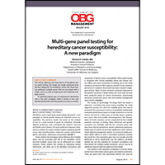Click here to download the PDF.
Shari Goldman Snow, MD
Assistant Professor of Clinical Obstetrics and Gynecology
Northwestern University
Feinberg School of Medicine
Chicago, IL
Dr. Snow reports that she is a consultant and speaker for Myriad Genetics Laboratories.
As gynecologists, every day we face an increasing number of clinical issues to consider when seeing our patients. While we strive for comprehensiveness, it is important to stratify our patient care to prioritize life-threatening risk factors. Identifying a pathogenic (deleterious) hereditary cancer gene mutation allows the clinician to implement life-saving, preventive management to reduce cancer risk and improve early cancer detection. Knowing a patient’s hereditary and familial cancer risk will drive gynecologic management and decision making. Without knowing a patient’s personal and/or family history of cancer, the clinician would be unable to determine appropriate treatment options for even the simplest gynecologic issue. Therefore, for every patient at every visit, it is imperative to systematically screen for personal and family risk of cancer and to test appropriate individuals for hereditary cancer syndromes.
The following cases illustrate how knowing a patient’s hereditary cancer risk can affect the care we provide.
CASE 1: Managing fibroids—and cancer risk—in a patient with BRCA1 mutation
YH is a 40-year-old patient, G0P0, who presented for a second opinion regarding large uterine fibroids. Her previous gynecologist treated the fibroids conservatively with medication and a dilation and curettage (D&C) procedure. The patient’s menorrhagia became severe, however, leading to anemia. A hysterectomy was recommended, but the patient wanted a second opinion to discuss options for preserving her uterus.
